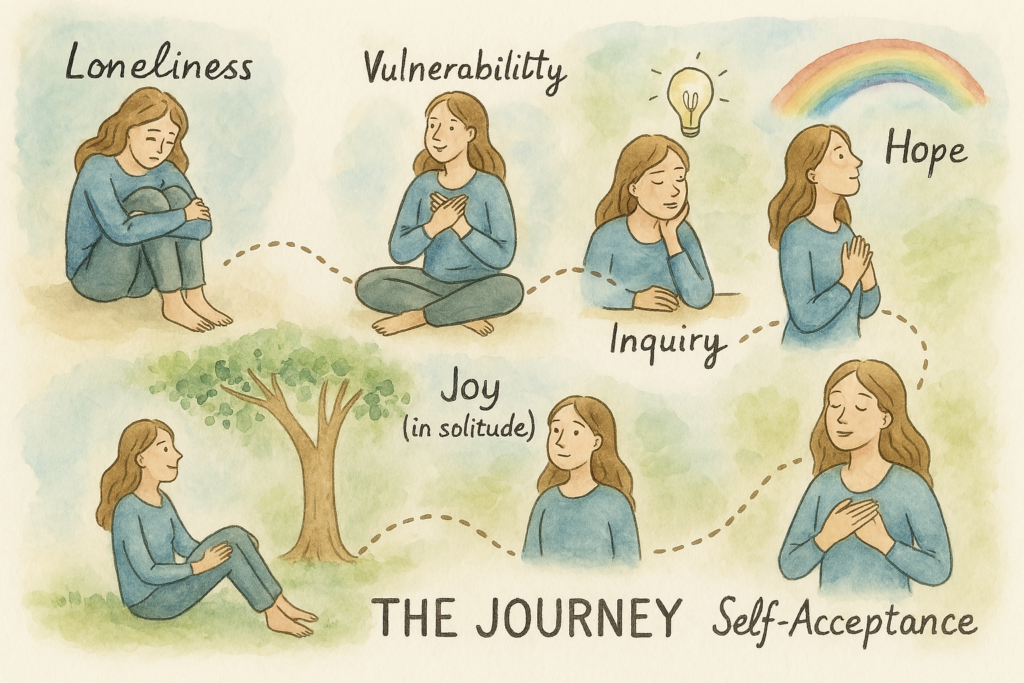
There are days when silence feels sharp. Not peaceful or meditative. Sharp. The kind that makes time drag. Nothing’s wrong, technically—no arguments, no rejections, no visible wounds. But something gnaws. It’s not sadness. Not boredom. Something colder. Loneliness.
That word makes people shift in their seats. It’s wrapped in shame. It smells of failure, like something’s missing and everyone else has it figured out. But no one really talks about what it actually feels like: that restless ache to be seen, to belong, to fill some invisible crack inside. It’s embarrassing to admit, even to yourself, that you crave something that badly.
I’m still working through this. Still catching myself in that loop—refreshing the screen, rereading an old message, picking up the phone and then putting it down. Wanting connection, but often for the wrong reasons. Because I feel hollow and I think someone else might plug the gap.
It’s only recently that I’ve started catching the pattern. When the silence gets heavy, my instinct is always to reach out. Not in generosity, but in hunger. That version of me doesn’t want to share joy or thoughts or company. She wants to be rescued. And that kind of reach never really lands. It drains the other person. It embarrasses me afterward. It leaves the crack wider.
The problem isn’t the need for people. We’re wired to connect. But when that need turns into a panic to avoid being alone, it curdles. It becomes clingy and desperate. It turns company into a transaction.
There’s something very unglamorous about learning to be alone. It’s not a montage. It’s not reading poetry on a windowsill while sipping tea. It’s often me, sitting in my cluttered room, noticing how quickly I grab for distraction. How fast I run from myself.
I’ve started asking different questions. Not deep, philosophical ones. Simple stuff. What am I avoiding right now? What do I actually want from that message I’m itching to send? Am I bored, scared, sad? Can I sit with that for five minutes without asking someone else to hold it for me?
It’s awkward and slow. Some days I manage. Some days I don’t. But I’m learning that being alone doesn’t mean being empty. It means being unfiltered. And that’s where the real discomfort kicks in. Because you start seeing yourself clearly—the parts you’ve ignored, the thoughts you’ve numbed, the ways you chase validation dressed as connection.
I’m not good at this yet.
I still reach for the noise.
I still scroll too long.
I still over-explain in conversations when I feel the silence stretch.
But I’m trying to hold myself through it. Not perfectly. Not always gracefully. Just trying.
And on some of those quiet days, something shifts. I catch a small moment—a laugh at my own joke, a gentle kind of focus while cooking, a calm breath during a walk. Nothing dramatic. Just enough to know that I’m capable of keeping myself company without shrinking.
People talk about being “whole on your own” like it’s a finish line. I think it’s more like flossing. You don’t master it. You just keep showing up for it. And it’s boring and necessary and deeply unsexy, but it works. It stops you from bleeding all over someone else in the name of love.
I still crave connection. But I’m learning to crave it from a steadier place.
I don’t want to latch. I want to lean.
I don’t want to be filled. I want to overflow.
When that shift starts to happen—when the panic recedes and the silence becomes bearable—it changes how I show up with others.
I’m less reactive.
I listen more.
I ask better questions.
I don’t need people to fix me.
I just want to be with them. That difference, even in small doses, feels like freedom.
I’m not there yet. But I’ve stopped running. And that, for now, feels like progress.
It took being alone to realize I was never really with myself.
Leave a Reply